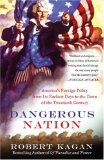Summary | Excerpt | Reviews | Beyond the book | Read-Alikes | Genres & Themes | Author Bio
America's Place in the World from Its Earliest Days to the Dawn of the Twentieth Century
by Robert Kagan

Critics' Opinion:
Readers' Opinion:
First Published:
Oct 2006, 544 pages
Paperback:
Nov 2007, 544 pages
 Book Reviewed by:
Book Reviewed by:
BookBrowse Review Team
Buy This Book
From the author of the immensely influential and best-selling Of Paradise and Power—a major reevaluation of America’s place in the world from the colonial era to the turn of the twentieth century.
Robert Kagan strips away the myth of America’s isolationist tradition and reveals a more complicated reality: that Americans have been increasing their global power and influence steadily for the past four centuries. Even from the time of the Puritans, he reveals, America was no shining “city up on a hill” but an engine of commercial and territorial expansion that drove Native Americans, as well as French, Spanish, Russian, and ultimately even British power, from the North American continent. Even before the birth of the nation, Americans believed they were destined for global leadership. Underlying their ambitions, Kagan argues, was a set of ideas and ideals about the world and human nature. He focuses on the Declaration of Independence as the document that firmly established the American conviction that the inalienable rights of all mankind transcended territorial borders and blood ties. American nationalism, he shows, was always internationalist at its core. He also makes a startling discovery: that the Civil War and the abolition of slavery—the fulfillment of the ideals of the Declaration—were the decisive turning point in the history of American foreign policy as well. Kagan's brilliant and comprehensive reexamination of early American foreign policy makes clear why America, from its very beginning, has been viewed worldwide not only as a wellspring of political, cultural, and social revolution, but as an ambitious and, at times, dangerous nation.
Chapter 1
The First Imperialists
This is a commonwealth of the fabric that hath an open ear, and a public concernment. She is not made for herself only, but given as a magistrate of God unto mankind, for the vindication of common right and the law of nature. Wherefore saith Cicero of the . . . Romans, Nos magis patronatum orbis terrarrum suscepimus quam imperium, we have rather undertaken the patronage than the empire of the world. —James Harrington, The Commonwealth of Oceana, 1656
The Myth of the “City upon a Hill”: The Americanization of the Puritan Mission
Misperceptions about the history, traditions, and nature of American foreign policy begin with the popular image of the Puritans who settled in New England in the 1630s. John Winthrop’s hopeful description of the Massachusetts Bay theocracy as a “city upon a hill” is emblazoned in the American self-image, a vivid symbol of what are widely seen as dominant isolationist and &#...
This is the first in a two-volume project by Kagan in which he lays out his argument that America is not, and never has been, isolationist. Taking us from the "Pilgrim Fathers" up to the dawn of the Twentieth Century, Kagan lays out his position clearly and eloquently. The question is, will his opinion be a surprise to you? The answer is probably yes, if you're American and your knowledge of American history is grounded in what you learned in school; but probably no if you're not American, have lived outside of America, or have read previous books that cover the same sort of ground, such as Niall Ferguson's Colossus or Cornel West's Democracy Matters (both published in 2004)...continued
Full Review
(1231 words)
This review is available to non-members for a limited time. For full access,
become a member today.
(Reviewed by BookBrowse Review Team).
Robert Kagan is senior associate at the
Carnegie Endowment for International
Peace, transatlantic fellow at the
German Marshall Fund, and a columnist
for The Washington Post (he writes a
monthly column on
international affairs). He is also a
contributing editor at the Weekly
Standard and the New Republic. He served
in the U.S. State Department from 1984
to 1988 as a member of the Policy
Planning Staff, as a principal
speechwriter for Secretary of State
George P. Shultz, and as deputy for
policy in the Bureau of Inter-American
Affairs.
...
This "beyond the book" feature is available to non-members for a limited time. Join today for full access.

If you liked Dangerous Nation, try these:

by Simon Sebag Montefiore
Published 2017
The Romanovs were the most successful dynasty of modern times, ruling a sixth of the world's surface for three centuries. How did one family turn a war-ruined principality into the world's greatest empire? And how did they lose it all?

by Margaret MacMillan
Published 2010
Margaret MacMillan, an acclaimed historian and “great storyteller” (The New York Review of Books), explores here the many ways in which history – its values and dangers – affects us all, including how it is used and abused.





The House on Biscayne Bay
by Chanel Cleeton
As death stalks a gothic mansion in Miami, the lives of two women intertwine as the past and present collide.

The Flower Sisters
by Michelle Collins Anderson
From the new Fannie Flagg of the Ozarks, a richly-woven story of family, forgiveness, and reinvention.

The Funeral Cryer by Wenyan Lu
Debut novelist Wenyan Lu brings us this witty yet profound story about one woman's midlife reawakening in contemporary rural China.
Your guide toexceptional books
BookBrowse seeks out and recommends the best in contemporary fiction and nonfiction—books that not only engage and entertain but also deepen our understanding of ourselves and the world around us.